Home » Jazz Articles » Big Band Report » Los Angeles Jazz Institute Festival "Big Band Spectacula...
Los Angeles Jazz Institute Festival "Big Band Spectacular" 2017, Part 4-4
LAX Westin Hotel
Los Angeles, CA
May 24-28, 2017
Part 1 | Part 2 | Part 3 | Part 4
Roger Neumann's Rather Large Band

Roger Neumann
saxophone, tenorb.1941
"Undecided," by

Charlie Shavers
trumpet1920 - 1971
Carol Chaikin
saxophone, altoBob Efford
b.1928
Tadd Dameron
piano1917 - 1965
"Blues For Frank" is Neumann's clever incorporation of nine tunes associated with vintage Sinatra into one convoluted but fun blues tune, and featured a thoughtful bluesy solo from baritonist Jennifer Hall, fiery bebop alto from Brian Scanlon, contrasting easy-does-it piano from Stradling, a soulful virtuoso trombone solo from
Ido Meshulam
tromboneMadeline Vergari came to the stage to sings three songs with the band -a neat, rollicking "All Of Me," a delightfully re-harmonised "When I Fall In Love" with lush flute-plus-flugelhorn section harmonies, and a hard-swinging "OK, All Right, You Win." The band's finale was "The Flintstones Theme," taken at breakneck speed, with some fleet-fingered Stradling piano, a mighty saxophone section soli, blistering harmon-muted trumpet from Mark Lewis, a fast-and-furious trombone solo from
Alan Kaplan
trombone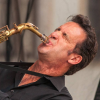
Brian Scanlon
trumpetFilm Session: Big Band Modern
The final film session on the big band story explored the big band beyond the bebop era, with a curious mix of film footage from more of the bands who were modernizing their repertoire in the 1950s and beyond—including the bands of

Les Brown
composer / conductor1912 - 2001

Charlie Barnet
saxophone1913 - 1991

Harry James
trumpet1916 - 1983

Neal Hefti
trumpet1922 - 2008

Bill Holman
composer / conductor- 2024
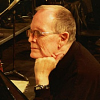
Bob Florence
piano1932 - 2008

Shorty Rogers
trumpet1924 - 1994

Tubby Hayes
saxophone, tenor1935 - 1973

Don Ellis
trumpet1934 - 1978

Gil Evans
composer / conductor1912 - 1988

Miles Davis
trumpet1926 - 1991

Oliver Nelson
saxophone1932 - 1975

Woody Herman
band / ensemble / orchestra1913 - 1987

Thad Jones
trumpet1923 - 1986

Mel Lewis
drums1929 - 1990

Sun Ra
piano1914 - 1993

Maria Schneider
composer / conductorCarl Saunders Septet
There had originally been scheduled a performance, by The Los Angeles Jazz Orchestra, of the Gil Evans "Sketches of Spain." This was evidently cancelled, as the charts had not arrived in time. In place of this was a fine septet organized at short notice for the occasion, with a formidable combination of three fine trumpeters, one trombone and rhythm section. The audience was treated to some relaxed, loose-but-tight small group jazz of the kind that is rooted in the early hard-bop jazz of the mid-1950s, remains timeless but does not stand still.
"Walkin,'" strongly associated with the '50s Davis outfits, featured multiple blues choruses from the three trumpets—great bebop from
Bob Summers
trumpetb.1944
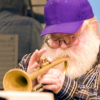
Ron Stout
trumpet
Carl Saunders
trumpet1942 - 2023

Christian Jacob
piano
Miles Davis
trumpet1926 - 1991
Sonny Berman
b.1925The Bill Holman Band
The brilliant

Bill Holman
composer / conductor- 2024
The band opened with "No Joy In Mudville," led by the solo trombone of
Erik Hughes
tromboneBob Efford
b.1928Jake Reed
drums"Thick, The Air," was a medium-to-up-tempo swinger, with a cheeky soprano-sax-plus-trumpet melody over bright, brassy harmonies. A fine soprano sax solo from
Bruce Babad
saxophone, altoThe major and much anticipated feature of the this concert was Holman's brilliant re-working of Joaquin Rodrigo's "Concerto de Aranjuez," Echoes of Aranjuez, which Holman had written and recorded a number of years earlier. In his hands, this much-loved 20th Century guitar concerto was re-birthed and transformed into an epic, many-layered work. Whereas Rodrigo's concerto was in three distinct movements, each built around a strong theme, Holman's arrangement positioned the various themes in new places, merging elements of the three original sections somewhat together, re-visiting motifs in unexpected places, and generating a splendid arrangement in four movements.
"Part I" opened in six-four time, set up by the rhythm section, and featuring
Bob Efford
b.1928"Part II" opened with Bruce Babad's flute, teasing with motifs of the famous slow melody over some ambiguously harmonized clarinets. Ron Stout brought the melody to life further on flugelhorn, before handing it back to the flutes. There followed some sectional call-and-response from the band, and fine soprano sax work from Bruce Babad, and clever 4/4 band working over a 6/8 rhythm section work, before more band flirtations with the theme. Christian Jacob played a fine, rubato, solo piano interlude, leading to a fast swinging piano solo in tempo with the rhythm section, joined by swinging backgrounds from the band.

Doug Webb
saxophone"Part III" began with a return to the second theme over a re-harmonized background, growing in density and then leading into the third theme in three-four, and Ron's Stout's trumpet playing and improvising around this melody. More polyphonic interplay in the band, then the first theme reappeared with Bruce Babad on soprano sax and Webb on tenor sax, playing fragments of this melody, followed by a chaotic free-form section with plaintive squeaks and squawks from the band. The band returned to tempo and again picked up the first theme, followed by a fine, 6/8 time drum solo from Reed. Exuberant brass led into the second theme above the band for the finale.
"Part IV" was a final short, energetic movement with punchy ensemble work, tempo changes but plenty of swing, and the band ended exuberantly on a high note.
The performance by the band of this difficult and demanding piece was impeccable, and the audience's enthusiastic applause was long and appreciative. Holman treated the crowd to an encore, his fast swinging arrangement of "After You've Gone," featuring spirited solos from Stout's trumpet,

Scott Whitfield
tromboneb.1963
The audience needed no proof of his place as a giant of jazz, but Holman has not been one to rest on his laurels. With great energy and spirit, he delivered a concert of brilliant music with his first-rate band, in a memorable, world-class performance.
The Les Hooper Big Band
Les Hooper
b.1940"Chicken Parade" opened with the concert with a jazz-rock-funk mood, featuring Pat Kelley's guitar in front of the band, Adrian Rosen's electric bass lines, and a funky alto saxophone solo from Bruce Babad, a fluid tenor sax solo from Alex Budman, before a hot-blooded Kelley guitar solo and some high-octane brass section work with clean unison trumpet lines. A Dixieland tune "That's A Plenty" was next, featuring a three-horn (trumpet, soprano sax and trombone), dixieland 'band- within-the-band' frontline, almost registering a Star Wars 'Cantina Band' sound. This was fast, fun and swinging, and featured a cheerful
Jeff Bunnell
trumpet
Andy Martin
tromboneb.1960
Jake Reed
drums
Johnny Mandel
arrangerb.1925

Donald Fagen
piano and vocalsb.1948

Kenny Dorham
trumpet1924 - 1972

Jacques Voyemant
trombone"Hop and Cool" featured fine brush work from Jake Reed, and a beautiful, brassy ensemble passage, with nice bass work from Rosen. The band eased into a nice, mid-tempo, swinging groove for a bluesy Dave Ryan trombone solo, and more cool, upper-register trumpet soloing from

Carl Saunders
trumpet1942 - 2023
In a nod to Miles Davis, "Freddie Freeloader" was lovingly re-created to evoke the sound and feel of the original Kind Of Blue recording in the first reading of the melody, and joined in the second one by the whole band. Jeff Bunnell played a fine, laid-back bebop trumpet solo,
Alex Budman
fluteb.1973
Phil Feather
saxophone"Barn Burner" was a fast Apple-Honey-like, swinging tune over 'rhythm changes,' with a brassy 'bridge.' It featured fine fleet-fingered bebop fire from Babad's alto sax, eight-bar quick solo flashes from each of the trumpets, and two brilliant trombone choruses from Andy Martin, and an exciting shout chorus from the band, another strong Babad alto solo, before the band reprised the theme. The band, strong from the beginning, seemed to reach their peak in the latter half of the concert, and the final three songs were definitely the finest.
Jazz America Traditional Jazz Band
The Jazz America organization was founded many years ago by the late West Coast tenor giant,

Buddy Collette
saxophone, tenor1921 - 2010

Richard Simon
bass, acousticb.1949
They featured a sampling of some of the earliest recorded jazz, from a century earlier, when the ODJB (Original Dixieland Jass Band) made the first jazz recordings in 1917, playing "Second Line," "The Original Dixieland One-Step," and continuing with "Livery Stable Blues," and "Bourbon Street Parade." The band was quite polished and almost all players were featured, if briefly, and showed a range of proficiency and experience, but a great deal of enthusiasm and willingness to play a solo. Other tunes performed were "Do You Know What It Means to Miss New Orleans," "Honeysuckle Rose," "Arabian Rhapsody," "Lady Be Good," "Riff Tide" and "Victory Stride." Richard Simon's enthusiastic leadership and witty introductions were much appreciated, as was his obvious passion for giving these young musicians an opportunity to develop their love for jazz. Notable were Jeremiah (drums), Harmony (on bass), Jordan (an alumnus on banjo), Lorenzo (on tuba) and many unnamed trombonists, trumpeters and saxophonists.
The BBB featuring Bernie Dresel
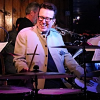
Bernie Dresel
drumsMonk's "Straight No Chaser" began the concert at a fast tempo, with a blistering Carl Saunders trumpet solo, vigorous alto-tenor sax trades between

Brian Scanlon
trumpet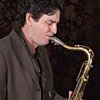
Rob Lockart
clarinet
Carl Saunders
trumpet1942 - 2023
Samba Quinte was a fast, happy tune, with trombones and tenor saxophones featured on the melody, handing over to the trumpets in a nice harmonized line.
Brian Williams
bass
Pepper Adams
saxophone, baritone1930 - 1986

Nick Brignola
saxophone, baritone1936 - 2002
"Wiggle Waggle" was a Latin jazz tour-de-force, beginning with a guitar-bass-drum vamp, joined by the brass. Trumpeter Jamie Hovorka, apparently un-fatigued by his record number of appearances at the festival, entered with a fiery, staccato burst of notes, before unleashing a powerful trumpet solo, sparks flying into the upper stratosphere. Bernie Dresel's driving rhythms then hushed to make way for or a thoughtful bass solo from Johnny Hatton, before rising in a crescendo of clever stick-work to return the main melody.
"Soulful Mr. Timmons," composed by

James Williams
piano1951 - 2004

Bobby Timmons
piano1935 - 1974
Jeff Bunnell
trumpet"Crossing The Boulevard" was a burner, beginning with very fast cymbal work from Dresel, and featured a commanding solo from Rob Lockart on tenor sax, full-bodied brass section passages, and a brilliant, gladiatorial trumpet solo from Saunders. Bernie Dresel played a fine and muscular drum solo, before a screaming band finale.
Dresel led from the drums throughout, with his powerful playing and his lively personality, and engaging manner. This was definitely a drummer's band, with a drummer used to playing between forte and fortissimo, and the sound desk probably could have adjusted their levels down accordingly, as the volume was mostly unnecessarily loud.
Peter Myers Orchestra
" data-original-title="" title="">Peter Myers has had a very successful career as a composer and arranger. Beginning his musical life as a trombonist, he has composed extensively for film and television, received many awards, and currently runs a big band that is dedicated to the preservation the music of a range of American composers, both in and out of jazz. Although this band is less than four years old, it has a committed band of fine musicians and a large book of his adventurous arrangements.
"Sister Sadie," by

Horace Silver
piano1928 - 2014
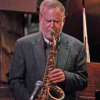
Kim Richmond
saxophone
Fats Waller
piano1904 - 1943

Woody Herman
band / ensemble / orchestra1913 - 1987

Buddy Rich
drums1917 - 1987

Horace Silver
piano1928 - 2014

Kim Richmond
saxophoneBob Summers
trumpetb.1944

John Lewis
piano1920 - 2001
Juliane Gralle
trombone, bassBob Summers
trumpetb.1944
"Hoe Down," by

Oliver Nelson
saxophone1932 - 1975

Oscar Pettiford
bass1922 - 1960

Jaco Pastorius
bass, electric1951 - 1987

Jaco Pastorius
bass, electric1951 - 1987
Vocalist " data-original-title="" title="">Loree Frazier took to the stage for the final two songs. The first, a swinging arrangement of "I've Got The World On A String," featured her sultry-toned voice, fine rhythmic sense. She was singing a little flat which detracted, but this was redeemed somewhat in the final song, "On A Clear Day," which began with a beautifully chorded, Latin introduction, later going into swing, with superb ensemble work and rhythm section drive, led by
Mel Lee
drumsOverall this was a fine performance by Myers' band featuring his own very idiosyncratic and at times, quirky, arrangements. It was based upon mostly familiar and well-loved material, but dressed up in ways one might never have imagined, and full of unexpected twists and turns. The band was tight, as was the driving rhythm section, and the very appreciative audience went out whistling the tunes.
Ann Patterson Maiden Voyage
Ann Patterson is a fine saxophonist, jazz educator and bandleader, who, among her many achievements, has done much throughout her career to advance the cause of women musicians in jazz. She has led her Maiden Voyage since the early 1980s, an adventurous big band with an all-women cast that champions compositions by great lady jazz composers, including many great works that deserve to be heard more widely. She presented the current incarnation of this swinging band for the second last concert of the festival, and presented a good mix of their widely ranging repertoire, with engaging and informative introductions to each piece.

Mary Lou Williams
piano1910 - 1981

Duke Ellington
piano1899 - 1974
Carol Chaikin
saxophone, alto
Cedar Walton
piano1934 - 2013

Kait Dunton
pianob.1983

Jennifer Leitham
bassBarbara Laronga
trumpetScheila Gonzales
woodwindsAnother Cary arrangement, "The Obligatory Blues," featured the flutes in its melody with friendly clarinet interjections. Sarah Bauza was featured in a playful trumpet solo, followed by more swinging, inventive piano from Kait Dunton. The final melody returned in the ensemble with some offbeat bass solo work from Jennifer Leitham. "Chief Natoma From Tacoma," another 1960s Williams composition, was a rollicking minor blues which featured Alisha Arde's solo trombone, a vigorous alto sax solo from Scheila Gonzales, and a marvelous Barbara Laronga plunger-muted trumpet solo with plenty of sparks. Not to be outdone, Arde returned with her trombone and more fine plunger work on the final melody.
Thelonious Monk's cheeky "I Mean You" featured the fine baritonist Jennifer Hall along with bassist Leitham, together on the melody, followed by fine solos from each, the latter initially solo unaccompanied and then joined by piano and drums. A mighty ensemble section followed, propelled by the hard-swinging rhythm section, and ended with a short baritone sax cadenza. Claude Debussy's "(My) Reverie," familiar to many from swing era adaptations (e.g. Glenn Miller) and a 1950s

Melba Liston
trombone1926 - 1999
The band played a Melba Liston ballad (name of tune not recorded) which showcased the tender, sensuous side of Patterson's saxophone playing, before breaking into double-time swing, and her strong, passionate bebop alto sax voice bursting through. Lori Stuntz took the final melody before the final, powerful alto sax cadenza from the leader. The band finished with There'll Never Be Another You, which was a fine up-tempo swinger. Beginning with a nice pedal-tone intro, flugelhorns and trombones in octaves followed with the melody, leading to harmonized flugels with reeds and a neat meter change into 6/4 time. Barbara Laronga took a magnificent flugelhorn solo, with her lyrical phrasing, gradually reaching higher into the upper register. Ann Patterson played a bebop alto solo of the highest order, followed by a fluid Kait Dunton piano solo and a powerful drum solo from Tina Raymond. The ensemble passages incorporated some lovely reharmonisation of this timeless Warren/Gordon standard.
Tom Kubis Big Band
Tom Kubis
arrangerBeginning with "Hey, We're Not Done Yet," a cheerful, tune based on Ja-Da changes, began with Kubis' muscular tenor sax, with a soulful solo into double-time, followed by a contrasting, relaxed solo from Ron Stout who was in top form. The pace slowed down for trombonist Francisco Torres, who played a quieter solo over piano, guitar and drums initially without bass, later joined by the whole rhythm section, building up to a very energetic, exciting solo. The band returned in full beneath a fine Mike Higgins guitar solo before some nice, easy going, soprano-sax-heavy reed section work, and indeed, they weren't done yet. In a tribute to legendary west coast trumpeter

Jack Sheldon
trumpet1931 - 2019
Jeff Bunnell
trumpetRusty Higgins
saxophone, alto
Fats Waller
piano1904 - 1943

Sal Lozano
saxophoneb.1961
Ellington band classic "Caravan" was composed by trombonist

Juan Tizol
trombone1900 - 1984

Andy Martin
tromboneb.1960

Ray Brinker
drumsKirsten Edkins
saxophone, tenor
Ron Stout
trumpetTags
Big Band Report
Bill Holman
Ken Poston
Los Angeles Jazz Institute Festival
Los Angeles
Big Band Spectacular
Roger Neumann
Carl Saunders
Peter Myers
Bernie Dresel
Ann Patterson
Tom Kubis
Comments
PREVIOUS / NEXT
Support All About Jazz
 All About Jazz has been a pillar of jazz since 1995, championing it as an art form and, more importantly, supporting the musicians who make it. Our enduring commitment has made "AAJ" one of the most culturally important websites of its kind, read by hundreds of thousands of fans, musicians and industry figures every month.
All About Jazz has been a pillar of jazz since 1995, championing it as an art form and, more importantly, supporting the musicians who make it. Our enduring commitment has made "AAJ" one of the most culturally important websites of its kind, read by hundreds of thousands of fans, musicians and industry figures every month.
Go Ad Free!
To maintain our platform while developing new means to foster jazz discovery and connectivity, we need your help. You can become a sustaining member for as little as $20 and in return, we'll immediately hide those pesky ads plus provide access to future articles for a full year. This winning combination vastly improves your AAJ experience and allow us to vigorously build on the pioneering work we first started in 1995. So enjoy an ad-free AAJ experience and help us remain a positive beacon for jazz by making a donation today.

Los Angeles
Concert Guide | Venue Guide | Local Businesses
| More...



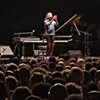

 Buy Now
Buy Now




















